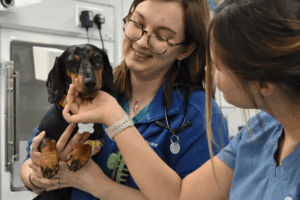Kennel cough, or canine infectious respiratory disease (CIRD), is a highly contagious respiratory condition in dogs. Despite the name, it’s not just a problem for dogs in kennels – it can affect any dog, anywhere. Here’s what you need to know about kennel cough, from spotting the symptoms to keeping your furry friend safe.
What is kennel cough?
Kennel cough is an umbrella term for various infections caused by viruses and bacteria, with Bordetella bronchiseptica being the most common culprit.
These pathogens inflame the trachea (commonly known as the windpipe) and bronchi (the bronchi are the two main branches that the trachea divides into, each leading to one lung), causing that well-known cough. While it’s rarely life-threatening, kennel cough can make your dog quite uncomfortable and might lead to complications if not treated.
How do dogs catch kennel cough?
Kennel cough spreads through:
- Direct contact with an infected dog
- Aerosol droplets from coughing or sneezing
- Contaminated surfaces, such as water bowls, toys, or even human hands
- Environments where dogs congregate – like kennels, dog parks, grooming salons, and training classes
Symptoms of kennel cough
The main indicator of kennel cough is a persistent, hacking cough that may sound like something is stuck in your dog’s throat. Other symptoms can include:
- Gagging or retching
- Sneezing
- Nasal discharge
- Mild fever
- Reduced appetite
- Lethargy
In severe cases, especially in puppies, elderly dogs, or those with compromised immune systems, kennel cough can lead to pneumonia.
Treatment for kennel cough
Although very mild cases, in fit and otherwise healthy dogs, may resolve on its own within 1-3 weeks, treatment can often help to alleviate symptoms. Treatment should however be considered for young and elderly dogs and those with underlying conditions to prevent complications. Treatment options include:
- Rest and hydration: Ensure your dog has a quiet, stress-free environment and plenty of fresh water
- Antibiotics: If a bacterial infection like Bordetella is suspected, antibiotics may be prescribed
- Steam therapy: Sitting with your dog in a steamy bathroom can help soothe their airways
If your dog’s symptoms worsen or they have trouble breathing, speak with St. Kitts immediately.
Preventing kennel cough
Vaccinating your dog is the best way to protect them. The kennel cough vaccine, often bundled with other essential vaccines, comes in three forms: injectable, intranasal, and oral. While it doesn’t guarantee complete immunity, it significantly reduces the severity and likelihood of infection.
At St Kitts, we offer a Pet Healthcare Plan that includes free kennel cough vaccines, among other benefits including parasite protection, nail clips, health checks and more.
Other prevention tips include:
- Avoiding crowded dog areas during outbreaks
- Regularly cleaning your dog’s belongings
- Ensuring your dog stays in good health with routine check-ups and a balanced diet
When to see St Kitts
If your dog shows signs of kennel cough or has been exposed to an infected dog, contact your local St Kitts practice:
St Kitts Vets Hartley Wintney: 01252 844044
St Kitts Vets Basingstoke: 01256 844944
Crookham Park Veterinary Centre: 01252 913990
Firgrove Veterinary Centre: 01252 877799





